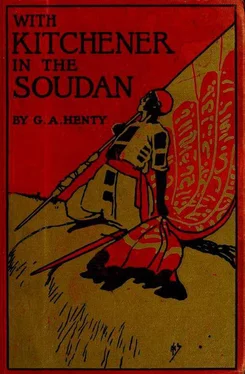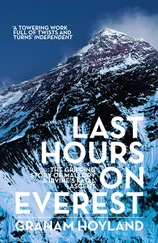" All day we held our position, killing great numbers but losing many men ourselves. By night our water was exhausted. Then the soldiers offered to attack the enemy, but they were twenty to one against us, and I said to them, 'No, fight one day longer if we can hold on. The Dervishes may retire or they may offer us terms.' So we stood. By the
next evening we had lost half our number. After they had drawn off, one of the Dervish emirs came in with a white flag and offered life to all who would surrender and would wear the badge of the Mahdi and be his soldiers. I replied that an answer should be given in the morning. When he had left I gathered the men together.You have fought nobly,' I said, 'but you have scarce a round of ammunition left. If we fight again to-morrow we shall all be slaughtered. I thank you in the name of the Khedive for all that you have done, but I do not urge you to reject the terms offered. Your deaths would not benefit the Khedive. As far as I am concerned you are free to accept the terms offered.'
" They talked for some time together, and then the three native officers who were still alive came forward.
"'Bimbashi,' they said, 'what will be done about you? We are Mahomedans and their countrymen, but you are a white man and a Christian. You would not fight for the Mahdi?'
" 'No,' I said, 'I would not fight for him, nor would I gain my life at the price of being his slave. I wish you to settle the matter without any reference to me. I will take my chance. I may not be here in the morning. One man might escape where many could not. All I ask is that I may not be watched. If in the morning I am not here, you can all say that I disappeared, and you do not know how. I do not myself know what I am going to do yet.'
" They went away, and in a quarter of an hour returned and said that the men would surrender. If they had water and ammunition they would go on fighting till the end; but as they had neither, they would surrender.
"I felt that this was best. The Soudanese love battle, and would as readily fight on one side as on the other. They have done their duty well to the Khedive, and will doubtless fight as bravely for the Mahdi.
" The men lay in a square as they had fought, with sentries placed to warn them should the Dervishes make a night-attack.
British troops would have been well-nigh maddened with thirst after being twenty-four hours without water and fighting all day in the blazing sun, but they felt it little. Thej r were thirsty, but in their desert marches they are accustomed to thirst and to hold on for a long time without water. I was better off, for I had drunk sparingly the day before from my water-bottle and had still a draught left in it.
"I waited until I thought that the men were all asleep; then I stripped and stained myself from head to foot. I had carried stain with me, in case I might have to go out as a native to obtain information. In my valise I had a native dress and a native cloth, in which I could have passed as a peasant, but not as one of the Baggara. However, I put it on, passed through the sleeping men, and went up to a sentry.
"You know me,' I said.I am your Bimbashi. I am going to try and get through their lines; but if it is known how I have escaped I shall be pursued and slain. Will you swear to me that if you are questioned you will say you know nothing of my flight?'
"' I swear by the beard of the Prophet,' the man said.May Allah protect you, my lord!'
"Then I went on. The night was fairly dark, and as the Dervishes were nearly half a mile away I had no fear of being seen by them. There were many of their dead scattered about, seventy or eighty yards from our square. I had all along felt convinced that it would be impossible to pass through their lines; therefore I went to a spot where I had noticed that a number had fallen close together, and went about examining them carefully. It would not have done to have chosen the dress of an emir, as his body might have been examined, but the ordinary dead would pass unnoticed. I first exchanged the robe for one marked with the Mahdi's patches. It was already smeared with blood. I then carried the body of the man whose robe I had taken off for some distance. I laid him down on his face, thinking that the absence of the patches would not be seen. Then I crawled
some thirty or forty yards nearer to the Dervishes, so that it would seem that I had strength to get that far before dying. Then I lay down partly on my side, so that the patches would show, but with my face downwards on my arm.
" I had, before dyeing my skin, cut my hair close to my head, on which I placed the Dervish's turban. The only property that I brought out with me was a revolver and this pocket-book. Both of these I buried in the sand; the pocket-book a short distance away, the pistol lightly covered and within reach of my hand, so that I could grasp it and sell my life dearly if discovered.
" Soon after daylight I heard the triumphant yells of the Dervishes, and knew that my men had surrendered. Then there was a rush of horse and foot, and much shouting and talking. I lifted my head slightly and looked across. Not a Dervish was to be seen in front of me. I felt that I had better move, so, taking up my pistol and hiding it, I crawled on my hands and knees to the spot where I had hidden this book, and then got up on to my feet and staggered across the plain as if sorely wounded and scarcely able to drag my feet along. As I had hoped, no one seemed to notice me, and I saw three or four other figures also making their way painfully towards where the Dervishes had encamped.
" Here were a few camels standing untended. Everyone had joined in the rush for booty—a rush to be met with bitter disappointment, for, with the exception of the arms of the fallen, and what few valuables they might have about their person, there was nothing to be gained. I diverged from the line I had been following, kept on until there was a dip in the ground that would hide me from the sight of those behind, then I started to run, and at last threw myself down in the scrub four or five miles away from the point from which I had started. I was perfectly safe for the present. The Dervishes were not likely to search over miles of the desert, dotted as it was with thick bushes. The question was as to the future. My position was almost as bad as could be; I was
without food or water, and there were hundreds of miles of desert between me and Khartoum. At every water-hole I should almost certainly find parties of Dervishes.
" From time to time I lifted my head and saw several large parties of the enemy moving in the distance. They were evidently bound on a journey, and were not thinking of looking for me. I chewed the sour leaves of the camel bush, and this to some extent alleviated my thirst. I determined at last that I would, in the first place, march to the wells towards which we had been pressing when the Dervishes came up to us. They were nearly three miles south of the spot where the square had stood. No doubt Dervishes would be there, but if discovered by them it was better to die so than of thirst. Half an hour before the sun sank I started. No horsemen were in sight, and if any were to come along I could see them long before they could notice me. Knowing the general direction, I was fortunate enough to get sight of the palm-grove which surrounded the wells before darkness set in.
"It lay about two miles away, and there were certainly moving objects round it. I lay down until twilight had passed, and then went forward. When within two or three hundred yards of the grove, I lay down again and Avaited. That the Dervishes would all go to sleep, however long I might wait, was too much to hope for. They would be sure to sit and talk far into the night of the events of the last three or four days. Shielding myself as well as I could by the bushes, I crawled up until I was in the midst of some camels which were browsing. Here I stood up, and then walked boldly into the grove. As I had expected, two or three score of Dervishes were sitting in groups, talking gravely. They had destroyed the Turks (as they always called the Egyptians and their infidel white leaders), but had suffered heavily themselves. The three hundred Soudanese who had surrendered, and who had taken service with the Mahdi, were but poor compensation for the losses they had suffered.
Читать дальше












